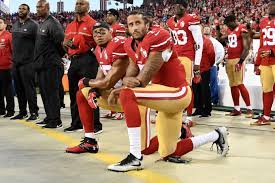To Kneel or Not To Kneel

November 8, 2016
Student athletes who kneel during the national anthem may be breaking school rules, but student athletes in Florida who kneel may be breaking Florida law.
If you’re a private school student, you don’t have to follow Florida law. You do, however, have to follow school rules; and private schools’ rules aren’t subject to federal laws. Private schools are different than public schools in that many do not receive federal funding. Consequently, they can make their own decisions and declare that kneeling, even if it is silent, is disruptive and a cause for expulsion. No private school students are guaranteed freedom of expression. This season, private school policy, personal beliefs and Florida law share the field with football — and opinions about kneeling may cause more rivalry than the game itself.
Florida’s Orange County school district insisted on September 16 that any student who decides to kneel during the national anthem must present a letter from his or her parents granting permission to kneel. The district then reversed that decision on September 19, stating that the letter is only necessary for students who want to sit during the pledge of allegiance. The school district based its decision on Florida statute s.1006.07(2), which says that a student has the right not to participate in reciting the pledge. Upon written request by his or her parent, the student must be excused from reciting the pledge, including standing and placing the right hand over his or her heart.
The district is correct that a written request to be excused from standing is necessary only for the pledge of allegiance. However, the district seems to overlook the same statute’s attitude towards the national anthem: When the national anthem is played, students and all civilians shall stand at attention. While students can sit during the pledge with parental permission, no such permission is mentioned regarding the anthem. It seems that if you are a public school student in Florida, you have one option when the anthem is played: stand up.
Since the San Francisco 49ers’ Collin Kaepernick refused to stand for the national anthem to demonstrate against social injustice, bitter debates have erupted declaring Kaepernick either a peaceful protestor or an unpatriotic agitator. Bolles history teacher Ms. Fluegel stated that, “certainly Colin Kaepernick is not the first athlete to use his visibility to protest.”
Either way, both sides agree, Kaepernick is exercising his right for freedom of expression. If you’re a public school student and you want to exercise your freedom of expression to emulate Kaepernick, your school must allow you to do so. Public schools that receive federal funding must adhere to the First Amendment and allow for students’ freedom of speech and expression, as long as the student does not cause violence or disruption.






